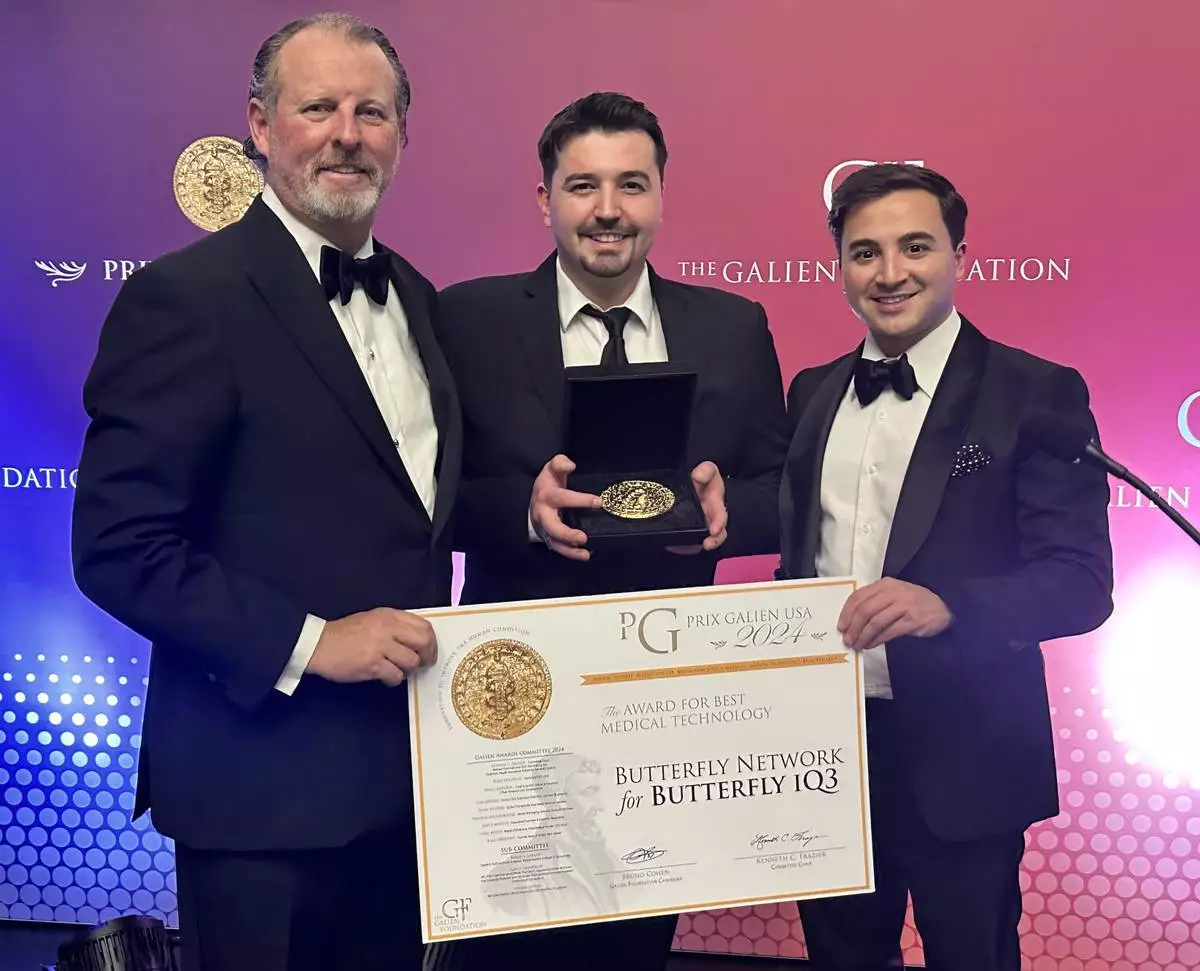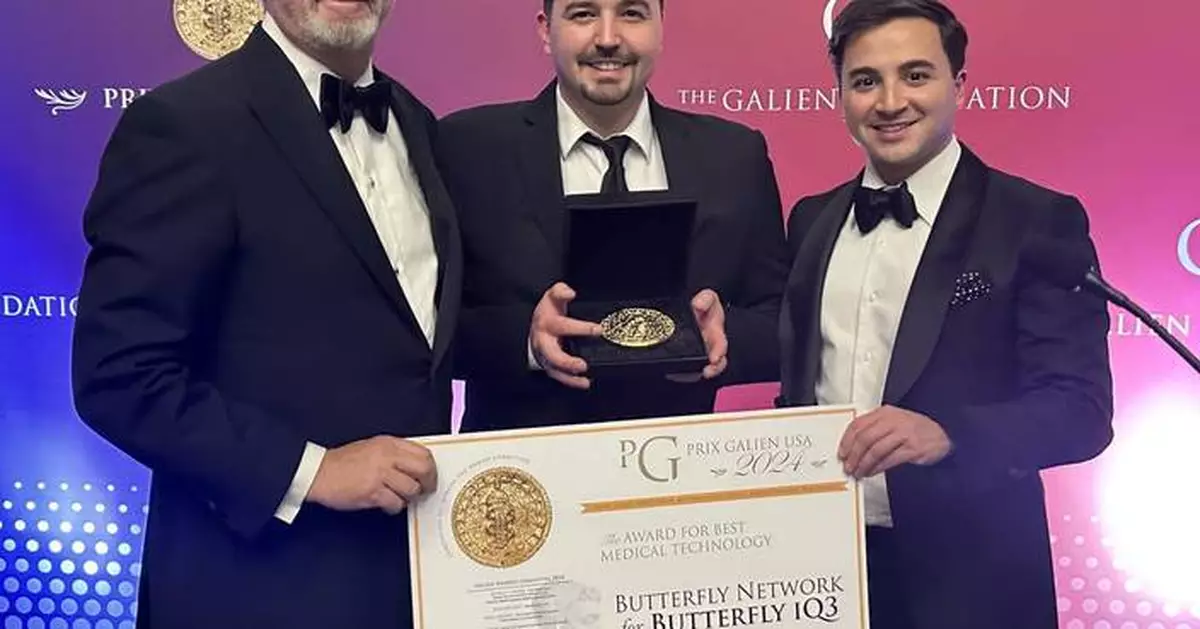BURLINGTON, Mass. & NEW YORK--(BUSINESS WIRE)--Nov 8, 2024--
Butterfly Network, Inc. (“Butterfly”) (NYSE: BFLY), a digital health company transforming care through the power of portable, semiconductor-based ultrasound technology and intuitive software, today announced that Butterfly iQ3™, its third-generation handheld ultrasound device, was the recipient of the Best Medical Technology Award at the 2024 Prix Galien USA Awards by the Galien Foundation.
This press release features multimedia. View the full release here: https://www.businesswire.com/news/home/20241108425693/en/
The Galien Foundation was established to foster and reward outstanding achievements in improving the global human condition through the development of innovative drugs and other treatments. First created in 1970 in honor of Galien, the father of medical science and modern pharmacology, the Prix Galien Awards have since grown into an influential program convening healthcare stakeholders across industry, science, government and medical press worldwide. The Prix Galien Awards are regarded as the “Nobel Prize of Life Sciences,” and the highest accolade for healthcare research and development.
This prestigious recognition highlights Butterfly’s commitment to making ultrasound imaging more affordable, sustainable, and scalable through its pioneering Ultrasound-on-Chip™ technology. The Butterfly iQ3 represents a leap forward in ultrasound technology, building upon the success of its predecessors with enhanced AI-powered features and novel digital image capture capabilities. Built on Butterfly’s proprietary P4.3 semiconductor – its most powerful Ultrasound-on-Chip™ platform released to date – the iQ3 represents a digital revolution in the ultrasound industry by offering clinicians portable, semiconductor-based imaging with premium handheld quality.
“Winning the Prix Galien Award for Best Medical Technology is an extraordinary testament to the hard work and dedication of our team that brought iQ3 to market this year,” said Joseph DeVivo, President, Chief Executive Officer, and Board Chairman of Butterfly Network. “Our Ultrasound-on-Chip™ technology harnesses the exponential advancements of Moore’s Law, allowing us to deliver increasingly powerful and cost-effective imaging tools. By leveraging this innovation, we are democratizing ultrasound, enabling practitioners everywhere to make faster, more accurate decisions, and ultimately transforming patient care on a global scale.”
Alongside Butterfly, this year’s awardees across various categories includes Pfizer, AstraZeneca, Daiichi Sankyo US, and other highly respected industry leaders.
In today’s announcement, Michael Rosenblatt, MD, Chair of the Prix Galien USA Awards Committee, Former Dean of Tufts University School of Medicine, and former Chief Medical Officer of Merck & Co. Inc., commented, "The Awards Committee is honored to witness the exceptional dedication and creativity of our nominees as they turn visionary ideas into transformative solutions for patients worldwide. Their unwavering commitment to advancing patient care is truly commendable, and we are honored to celebrate their outstanding contributions to global health.”
Butterfly is honored to be recognized as the Best Medical Technology against a world-class group of nominees. To view the full list of 2024 nominees, visit: https://www.prnewswire.com/news-releases/the-galien-foundation-announces-2024-prix-galien-usa-nominees-for-best-digital-health-solution-best-medical-technology-incubators-accelerators-and-equity-and-best-startup-302220657.html.
About the Galien Foundation
The Galien Foundation fosters, recognizes and rewards excellence in scientific innovation to improve the state of human health. Our vision is to be the catalyst for the development of the next generation of innovative treatments and technologies that will impact the state of medical practice and save lives.
The Foundation oversees and directs activities in the US for the Prix Galien, an international awards program dedicated to progress through innovative medicines development, with chapters in 14 countries and Africa. The Prix Galien was created in 1970 by Roland Mehl in honor of Galien, the father of medical science and modern pharmacology. Worldwide, the Prix Galien is regarded as the equivalent of the Nobel Prize in biopharmaceutical research.
About Butterfly Network
Founded by Dr. Jonathan Rothberg in 2011, Butterfly Network is a digital health company with a mission to democratize medical imaging by making high-quality ultrasound affordable, easy-to-use, globally accessible, and intelligently connected, including for the 4.7 billion people around the world lacking access to ultrasound. Butterfly created the world's first handheld single-probe, whole-body ultrasound system using semiconductor technology, Butterfly iQ. The company has continued to innovate, leveraging the benefits of Moore’s Law, to launch its second-generation Butterfly iQ+ in 2020, and third generation iQ3 in 2024 – each with increased processing power and performance enhancements. The disruptive technology has been recognized by TIME’s Best Inventions, Fast Company’s World Changing Ideas, CNBC Disruptor 50, and MedTech Breakthrough Awards, among other accolades. With its proprietary Ultrasound-on-Chip™ technology, intelligent software, and educational offerings, Butterfly is paving the way to mass adoption of ultrasound for earlier detection and remote management of health conditions around the world. Butterfly devices are commercially available to trained healthcare practitioners in areas including, but not limited to, parts of Africa, Asia, Australia, Europe, the Middle East, North America and South America; to learn more about available countries, visit: www.butterflynetwork.com/choose-your-country.


Butterfly Network's Chief Executive Officer, Joseph DeVivo; Co-Founder & VP of Core Technology, Nevada Sanchez; and Chief Strategy Officer, Darius Shahida, accept the Prix Galien USA Best Medical Technology Award. (Photo: Business Wire)
NEW YORK (AP) — As a Democrat who immersed himself in political news during the presidential campaign, Ziad Aunallah has much in common with many Americans since the election. He's tuned out.
“People are mentally exhausted,” said Aunallah, 45, of San Diego. “Everyone knows what is coming and we are just taking some time off.”
Television ratings — and now a new poll — clearly illustrate the phenomenon. About two-thirds of American adults say they have recently felt the need to limit media consumption about politics and government because of overload, according to the survey from the Associated Press-NORC Center for Public Affairs Research.
Smaller percentages of Americans are limiting their intake of news about overseas conflicts, the economy or climate change, the poll says. Politics stand out.
Election news on CNN and MSNBC was taking up too much of Sam Gude's time before the election, said the 47-year-old electrician from Lincoln, Nebraska. “The last thing I want to watch right now is the interregnum,” said Gude, a Democrat and no fan of President-elect Donald Trump.
The poll, conducted in early December, found that about 7 in 10 Democrats say they are stepping back from political news. The percentage isn't as high for Republicans, who have reason to celebrate Trump's victory. Still, about 6 in 10 Republicans say they've felt the need to take some time off too, and the share for independents is similar.
The differences are far starker for the TV networks that have been consumed by political news.
After election night through Dec. 13, the prime-time viewership of MSNBC was an average of 620,000, down 54% from the pre-election audience this year, the Nielsen company said. For the same time comparison, CNN's average of 405,000 viewers was down 45%.
At Fox News Channel, a favorite news network for Trump fans, the post-election average of 2.68 million viewers is up 13%, Nielsen said. Since the election, 72% of the people watching one of those three cable networks in the evening were watching Fox News, compared to 53% prior to election day.
A post-election slump for fans of the losing candidate is not a new trend for networks that have become heavily identified for a partisan audience. MSNBC had similar issues after Trump was elected in 2016. Same for Fox in 2020, although that was complicated by anger: many of its viewers were outraged then by the network's crucial election night call of Arizona for the Democratic presidential candidate, Joe Biden, and sought alternatives.
MSNBC had its own anger issues after several “Morning Joe” viewers became upset that hosts Joe Scarborough and Mika Brzezinski visited Trump shortly after his victory last month. Yet while the show's ratings are down 35% since Election Day, that's a smaller drop than the network's prime-time ratings.
CNN points out that while it has been suffering in the television ratings, its streaming and digital ratings have been consistent.
MSNBC can take some solace in history. In previous years, network ratings bounce back when the depression after an election loss lifts, When a new administration takes office, people who oppose it are frequently looking for a gathering place.
“I’ll be tuning back in once the clown show starts,” Aunallah said. “You have no choice. Whether or not you want to hear it, it's happening. If you care about your country, you have no choice but to pay attention.”
But the ride may not be smooth. MSNBC's slide is steeper than it was in 2016; and there's some question about whether Trump opponents will want to be as engaged as they were during his first term. People are also unplugging from cable television in rates that are only getting more rapid, although MSNBC believes it has bucked this trend eating away at audiences before.
The poll indicates that Americans want less talk about politics from public figures in general. After an election season where endorsements from celebrities like Taylor Swift made headlines, the survey found that Americans are more likely to disapprove than approve of celebrities, large companies and professional athletes speaking out about politics.
Still, Gude is among those discovering other ways to get news to which he does want to pay attention, including on YouTube.
MSNBC is also in the middle of some corporate upheaval that raises questions about potential changes. Parent company Comcast announced last month that the cable network is among some properties that will spin off into a new company, which will give MSNBC new corporate leadership and cut its ties to NBC News.
Some of the Americans who have turned away from political news lately also had some advice for getting them engaged again.
Gude said, for example, that MSNBC will always have a hard-core audience of Trump haters. But if the network wants to expand its audience, “then you have to talk about issues, and you have to stop talking about Trump.”
Kathleen Kendrick, a 36-year-old sales rep from Grand Junction, Colorado, who's a registered independent voter, said she hears plenty of people loudly spouting off about their political opinions on the job. She wants more depth when she watches the news. Much of what she sees is one-sided and shallow, she said.
“You get a story but only part of a story,” Kendrick said. “It would be nice if you could get both sides, and more research.”
Aunallah, similarly, is looking for more depth and variety. He's not interested “in watching the angry man on the corner yelling at me anymore,” he said.
“It's kind of their own fault that I'm not watching,” he said. “I felt they spent all this time talking about the election. They made it so much of their focus that when the main event ends, why would people want to keep watching?”
—-
The poll of 1,251 adults was conducted Dec. 5-9, 2024, using a sample drawn from NORC’s probability-based AmeriSpeak Panel, which is designed to be representative of the U.S. population. The margin of sampling error for adults overall is plus or minus 3.7 percentage points.
—-
Sanders reported from Washington. David Bauder writes about media for the AP. Follow him at http://x.com/dbauder and https://bsky.app/profile/dbauder.bsky.social.

FILE - Jim, left, and Tamara Hamilton watch former President Donald Trump speak on television on Thursday, July 18, 2024, in Milwaukee. (AP Photo/Mike Stewart, File)

FILE - People watch as television screens show Republican presidential nominee former President Donald Trump addressing supporters on Election Day, Tuesday, Nov. 5, 2024, at Comet Tavern in Seattle. (AP Photo/Lindsey Wasson, File)

FILE -Supporters of former President Donald Trump drink beers as they watch him speak on television on Thursday, July 18, 2024, in Seal Beach, Calif. (AP Photo/Ashley Landis, File)

FILE - People watch TV screens showing a debate between Democratic presidential nominee Vice President Kamala Harris, right on screen, and Republican presidential nominee former President Donald Trump, at Sports Grill Kendall, where the Miami-Dade Democratic Hispanic Caucus had organized a watch party, Tuesday, Sept. 10, 2024, in Miami. (AP Photo/Rebecca Blackwell, File)















